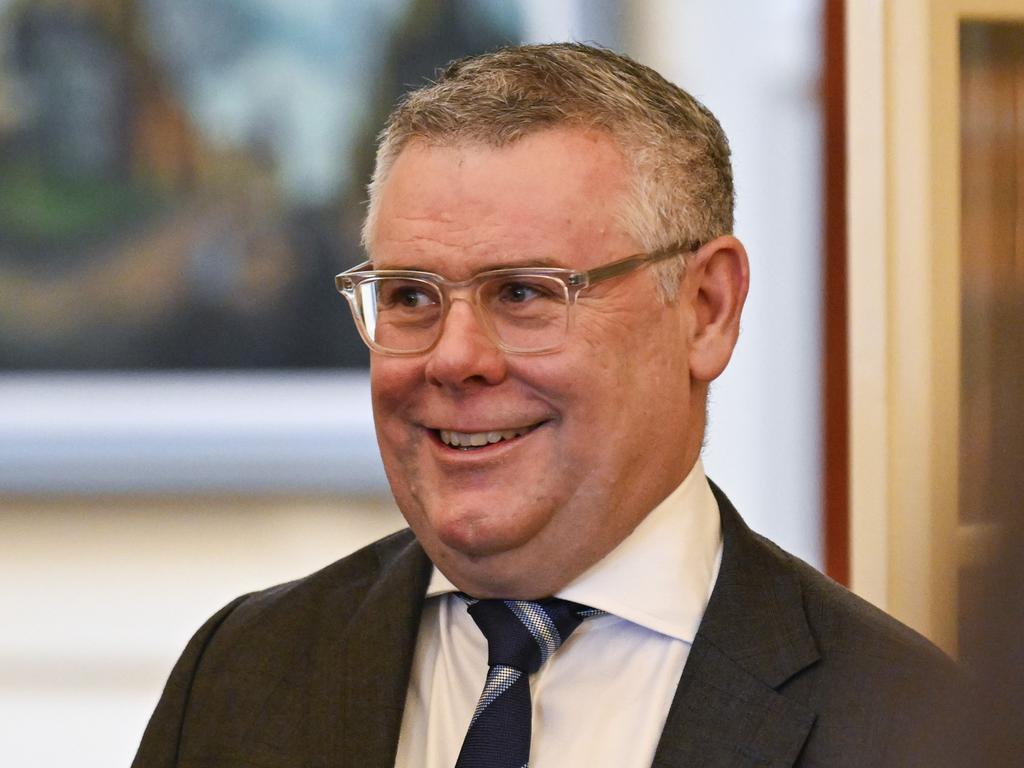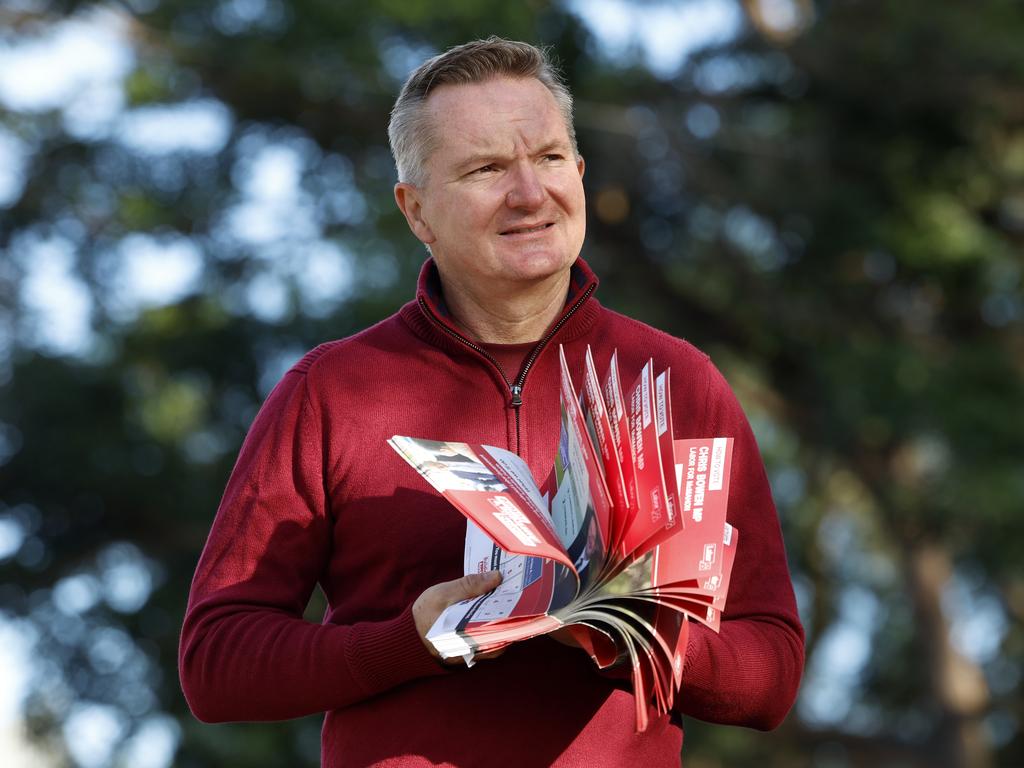Chris Bowen feels ‘silent’ wind at his back on green agenda
An emboldened Chris Bowen has doubled down on Labor’s rollout of offshore wind farms, renewables and the phase-out of coal-fired power plants in a post-election attack on critics of his green power agenda.

Emboldened Climate Change and Energy Minister Chris Bowen has doubled down on Labor’s rollout of offshore wind farms, renewables and the phase-out of coal-fired power plants in a post-election attack on critics of his green power agenda, who he declares were rejected by Australia’s “silent majority”.
After being sworn in on Tuesday for a second term, Mr Bowen will turbocharge Labor’s clean-energy revolution to achieve the government’s ambitious goal of 82 per cent of renewables in the electricity grid by 2030.
The Australian understands the Climate Change Authority is weeks from finalising its advice on an upgraded 2035 emissions-reduction target, which will be more aggressive than Labor’s current 2030 pledge to slash emissions by 43 per cent.
During the five-week election campaign, Anthony Albanese avoided focusing on climate change and energy after jettisoning the Powering Australia modelling Labor took to the 2022 election promising to cut power bills by $378 from 2030.
As the Albanese government focuses on winning its bid to co-host the UN COP31 climate change summit with Pacific nations next year, Mr Bowen must finalise and submit Australia’s updated Nationally Determined Contributions, including 2035 targets, by September.
Writing in The Australian, Mr Bowen invokes the ”silent majority” phrase popularised by former US Republican president Richard Nixon to describe Labor’s landslide May 3 election victory and rejection by voters of anti-climate action “noise”. “The federal election result is clear,’’ he writes. “Peter Dutton described the 2025 election as a referendum on Australia’s energy choices. Fair enough. And the results of that referendum are clear: in uncertain times Australians want an affordable plan, backed by the experts.”
In the wake of the Coalition’s heavy election defeat, which delivered at least 94 seats to Mr Albanese, new Liberal leader Sussan Ley and Nationals leader David Littleproud this week revealed they would review the parties’ current policy supporting net-zero emissions by 2050.
Mr Dutton’s energy policy, which promised to build up to seven nuclear reactors across the country, will also be re-evaluated in the election post-mortem.
Dissecting results of the election, Mr Bowen references swings towards Labor MPs and candidates in seats where offshore wind zones had been designated, which were heavily targeted by the Coalition.
“It was speculated that Labor’s plans for offshore wind could cost us the seats of Paterson and Gilmore, among others,” he writes. “Meryl Swanson, who has constructively advocated for her community, saw her two-party-preferred vote in Paterson increased by 4.25 per cent. Swings in Nelson Bay, the epicentre of the offshore wind debate were small either way.
“In Cunningham, MP Alison Byrnes who was a courageous and vocal advocate of offshore wind in her community increased her vote in both primary and two-party terms. Two of Labor’s big wins on the night came in seats adjoining the Bass Strait offshore wind zone: Bass and Braddon. And the seat of Forrest, which hosts the Bunbury offshore wind zone saw the Labor candidate come a lot closer to snatching it than most people predicted.”
Mr Bowen will set to work on bedding down the government’s renewables-focused and electric-vehicle policies to achieve the Prime Minister’s clean energy and emissions reduction targets.
The Climate Change Authority’s advice on a 2035 target, which was delayed last December until after the election to include updated analysis on the impacts of US President Donald Trump’s policies, is expected to be handed to the government in either late June or early July.
Mr Bowen writes: “I am a realist: conservative commentators who don’t support our renewable transition are not about to accept the electoral reality and the lessons from the 2025 election. But next time you read someone waxing lyrical about how unpopular renewable energy is, at least now there is real world data to remind us about how wrong they are.”
The 52-year-old says “one of the great myths of the climate change debate … is that inner-city dwellers support strong climate action and that the rest of us are lukewarm or hostile”.
“In fact, people in the suburbs and regions are living the transition and benefiting from it,” Mr Bowen writes. “The top three suburbs in NSW benefiting from our electric-vehicle discount aren’t in the inner city or north shore. They are Baulkham Hills, Marsden Park and Kellyville, all deep in northwest Sydney. You’re more likely to see an EV in Werribee than Toorak. When it comes to solar panels, there are 10 times more solar arrays in Blacktown (in my electorate) than in Bondi (in Wentworth).”
Declaring that “our ageing coal-fired power stations are nearing retirement … they aren’t getting any cheaper or more reliable with age”, Mr Bowen writes that decisive action is required to secure an affordable and reliable energy grid. “We need to replace them, and Australia has the best wind and sun to power our future,” he says. “ We’ve made sure in the immediate term there is energy bill relief, while we deliver lasting structural reform. Australians understand this is more than a three-year fix, and we’ll keep working to deliver the modern grid Australians deserve.”
Repeating Labor’s election scare campaign that Mr Dutton’s nuclear plan would have cost $600bn, Mr Bowen accuses the Coalition of backing an anti-renewables agenda to secure “internal political peace at any cost to taxpayers”.
Mr Bowen, who sustained a small swing against him after being targeted in his western Sydney seat of McMahon by a cashed-up independent candidate, says Mr Dutton “paid a particularly high price for his support of Ted O’Brien’s nuclear policy”.
As Mr Albanese went about reshaping the government and swearing in his ministers on Tuesday, the government released machinery of government changes that confirmed Mark Butler would lead a new mega-department overseeing health, aged care and disability.
Mr Butler will oversee negotiations on contentious hospital funding agreements with states, while also leading the Pharmaceutical Benefits Scheme, mental health, private health insurance, the NDIS and a separate system of “foundational supports” that will cater for those with milder disabilities. By taking foundational supports away from the Department of Social Services, Mr Albanese’s factional rival Tanya Plibersek was left with a watered-down portfolio focused on welfare payments, domestic violence prevention and volunteering.
Additional reporting: Sarah Ison






To join the conversation, please log in. Don't have an account? Register
Join the conversation, you are commenting as Logout